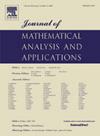抛物方程和系统的基本解:普遍存在,唯一性,表示
IF 1.2
3区 数学
Q1 MATHEMATICS
Journal of Mathematical Analysis and Applications
Pub Date : 2025-06-16
DOI:10.1016/j.jmaa.2025.129806
引用次数: 0
摘要
本文给出了一种通用的、概念简单的、系统的方法来证明具有变分定义的非光滑、时变、椭圆部分的抛物型方程弱解的Cauchy问题的适定性。我们的弱解类是在最小假设下得到的。我们证明了一个基本解的存在唯一性,这个基本解在这种普遍性中似乎是新的:对于零源的初值问题,它总是与相关演化族一致,并且它产生了所有弱解的表示。我们的策略是一种变分方法,避免密度参数,弱解的先验正则性或光滑算子的正则化。我们的主要工具之一是嵌入结果,它产生弱解的时间连续性,超越了著名的狮子正则定理,并且处理各种源项。我们用三个具体的应用来说明我们的结果:二阶一致椭圆部分在Dirichlet边界条件下,积分-微分椭圆部分,和二阶退化椭圆部分。本文章由计算机程序翻译,如有差异,请以英文原文为准。
Fundamental solutions for parabolic equations and systems: Universal existence, uniqueness, representation
In this paper, we develop a universal, conceptually simple and systematic method to prove well-posedness to Cauchy problems for weak solutions of parabolic equations with non-smooth, time-dependent, elliptic part having a variational definition. Our classes of weak solutions are taken with minimal assumptions. We prove the existence and uniqueness of a fundamental solution which seems new in this generality: it is shown to always coincide with the associated evolution family for the initial value problem with zero source and it yields representation of all weak solutions. Our strategy is a variational approach avoiding density arguments, a priori regularity of weak solutions or regularization by smooth operators. One of our main tools are embedding results which yield time continuity of our weak solutions going beyond the celebrated Lions regularity theorem and that is addressing a variety of source terms. We illustrate our results with three concrete applications: second order uniformly elliptic part with Dirichlet boundary condition on domains, integro-differential elliptic part, and second order degenerate elliptic part.
求助全文
通过发布文献求助,成功后即可免费获取论文全文。
去求助
来源期刊
CiteScore
2.50
自引率
7.70%
发文量
790
审稿时长
6 months
期刊介绍:
The Journal of Mathematical Analysis and Applications presents papers that treat mathematical analysis and its numerous applications. The journal emphasizes articles devoted to the mathematical treatment of questions arising in physics, chemistry, biology, and engineering, particularly those that stress analytical aspects and novel problems and their solutions.
Papers are sought which employ one or more of the following areas of classical analysis:
• Analytic number theory
• Functional analysis and operator theory
• Real and harmonic analysis
• Complex analysis
• Numerical analysis
• Applied mathematics
• Partial differential equations
• Dynamical systems
• Control and Optimization
• Probability
• Mathematical biology
• Combinatorics
• Mathematical physics.

 求助内容:
求助内容: 应助结果提醒方式:
应助结果提醒方式:


